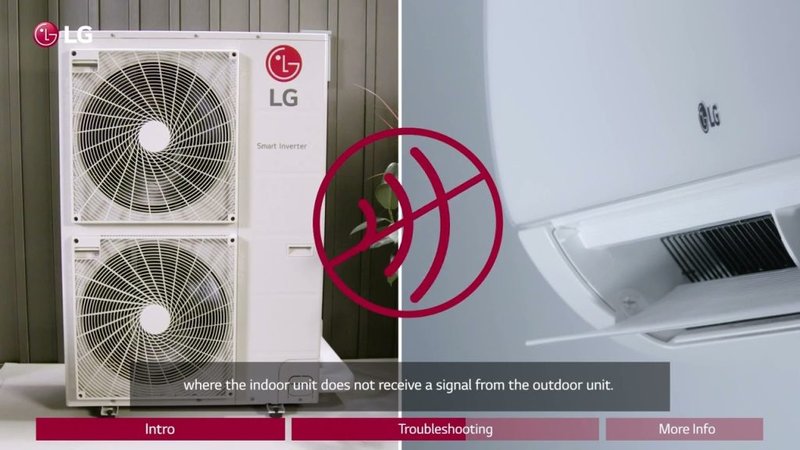
When dealing with home appliances, it’s crucial to understand that error codes like F2 are not mere suggestions—they’re more like your air conditioner’s way of waving a red flag. This particular code can be a signal that something in your system isn’t working as it should. Think of it as a smoke alarm going off. You wouldn’t just unplug the alarm and go back to sleep, would you? Instead, you’d want to figure out whether there’s smoke—and more importantly, where it’s coming from. In the same way, Error Code F2 on your LG air conditioner is your cue to investigate further rather than ignore it.
What Does Error Code F2 Mean?
Firstly, let’s decode the mystery behind F2. On LG air conditioners, this error code typically points to an issue with the indoor unit’s temperature sensor. It’s like when your body’s thermostat is off—if you’re feeling too hot or cold, you know something’s not quite right. Similarly, F2 indicates that the sensor tasked with monitoring temperatures inside your unit might be malfunctioning.
You see, the temperature sensor is essential for maintaining the perfect climate in your room. It acts like a detective, constantly monitoring the air conditions and ensuring everything stays just right. When it fails to perform its duty, your air conditioner might not cool or heat effectively. This can lead to uncomfortable temperature swings or even a system shutdown. So, ignoring this could mean you’ll end up with an air conditioner that’s about as useful as a fan on a hot, humid day.
Now, you might be wondering: what causes the F2 error in the first place? Often, it’s due to a faulty sensor or a loose connection. Imagine your air conditioner’s sensor as a key player on your favorite sports team. If the star player has an injury or isn’t communicating well with the rest of the team, the whole game could fall apart. Similarly, if the sensor is faulty or not well-connected, it can throw off the entire system’s performance.
Can You Fix It On Your Own?
So, can you roll up your sleeves and fix it? Maybe. If you’re somewhat handy, you could try checking the sensor connection. Here’s a simple analogy: imagine your air conditioner’s components are like Lego pieces. Sometimes, a piece gets loose, and all it needs is a little push to snap back into place. Carefully inspect the wiring and ensure everything is snug and secure.
If you’re not comfortable doing this yourself, it might be time to call in a professional. Sometimes, what seems like a minor issue could be a tip of the iceberg situation. A trained technician would have the tools and expertise to diagnose and resolve the problem promptly. They’ll essentially be like a mechanic for your air conditioner, ensuring it runs smoothly again.
Another thing to keep in mind is that if your air conditioner is still under warranty, tampering with it might void that protection. It’s like trying to fix your car’s engine with no experience; you might just end up causing more harm than good. So, always consider your warranty options and think about calling LG or an authorized service provider for assistance.
What Happens If You Ignore It?
Imagine ignoring a leaky roof—at first, it’s just a little drip, but over time it could lead to significant water damage. Similarly, choosing to ignore the F2 error code might save you from immediate hassle, but it could lead to bigger headaches down the road. The air conditioner’s performance could degrade over time, leading to inefficient cooling, increased energy bills, and eventually, a complete breakdown.
Long-term neglect could also mean you’re unknowingly causing more damage to other components of your air conditioner. It’s like running a marathon with a sprained ankle—it might work for a while, but eventually, something’s got to give. The strain on the system could cause parts to wear out quicker, leading to more costly repairs or even the need for a full replacement.
So, what’s the best course of action? At the very least, it’s crucial to consult the user manual that came with your air conditioner for specific guidance on the F2 error. This can offer insights into whether there are quick fixes or steps you should take immediately. Moreover, regular maintenance checks are your best defense against unexpected errors. Make it a habit to schedule regular servicing, ensuring your unit runs efficiently and prolonging its lifespan.
Preventative Tips and Maintenance Suggestions
Now that you know how important it is to address the error code, let’s look at how you can prevent it from happening again. Preventative maintenance is like going for regular health checkups for your air conditioner, ensuring it performs at its best.
Regularly clean or replace air filters—dust and dirt can accumulate, leading to inefficiency and potential error codes. Think of your air conditioner like your lungs; if they’re clogged, you can’t breathe properly. Ensure there’s no blockage in the airflow to keep everything running smoothly.
Also, consider having a professional check the unit annually. They can clean parts you can’t see or reach and check for any potential issues before they become serious. It’s like having a trusted mechanic check your car before a long road trip, ensuring everything is in top shape.
Lastly, be attentive to any unusual noises, odors, or performance issues with your air conditioner. These could be early signs of a problem, and addressing them quickly can save you time, stress, and money in the long run. Remember, a little attention to detail now can lead to a lot of peace of mind later on.